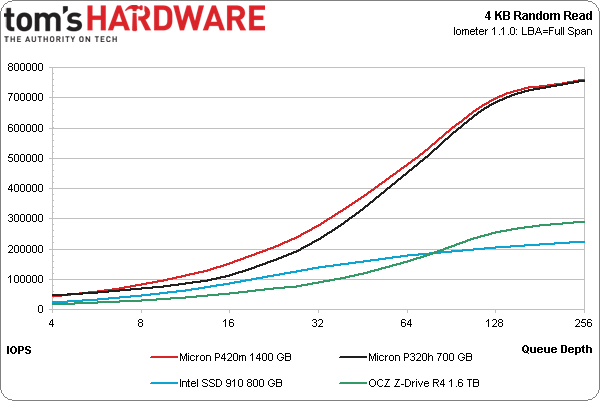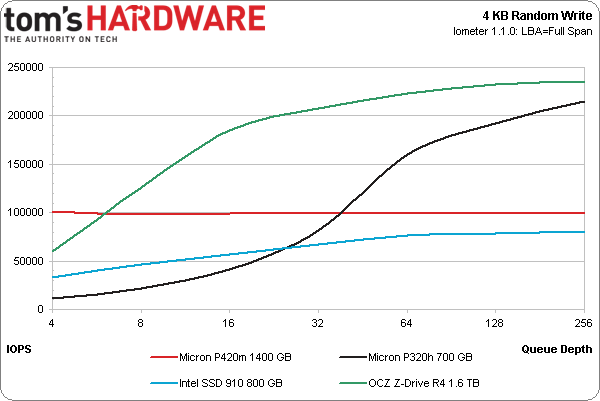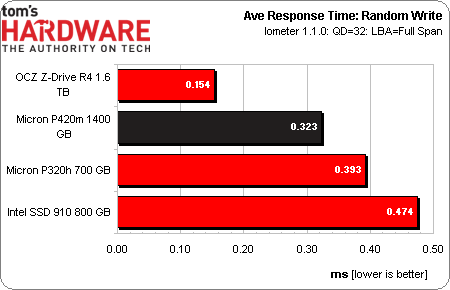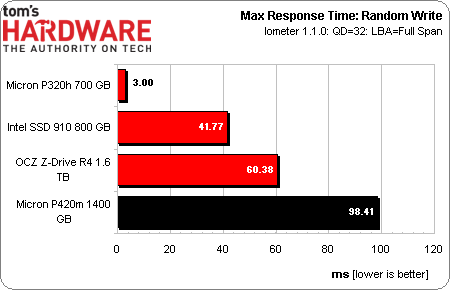Micron P420m SSD Review: 1.4 TB Of PCI Express-Attached Storage
After the success of its P320h, Micron is following up with the P420m, an MLC-based PCI Express x8 add-in card aimed at more read-oriented enterprise customers. How does it compare to the company's SLC-based flagship? We benchmark ours thoroughly.
Results: 4 KB Random Performance And Latency
Even though the P320h has a slight edge on the datasheet, the P420m came away with a close win in random 4 KB read operations. Both drives absolutely torched the competition. Even the best enterprise-oriented SATA SSDs only hit 90,000 IOPS. You would need eight of them on an efficient RAID controller to come close to the 760,000 IOPS we see from the P420m.
A thread you're going to see from here on out in this story is strange write behavior, both good and bad, from the P420m. When it comes to random 4 KB writes, we end up on the good side. Normally, you need a medium-sized command queue to get writes up to spec. Far fewer than the reads, but still 16-32. The P420m hits its specification at a queue depth of one, though. It didn't seem to matter how many more commands we threw at it; performance remained constant.
Also good is that we're consistently over 110,000 IOPS, blowing past Micron's 95,000 IOPS specification. Again, the P420m tops Intel's SSD 910, but falls short of the P320h and OCZ Z-Drive. Considering the NAND technology and pricing of each device, this is what we'd expect.
The average response times line up well with the random write performance we saw above. Once again, nothing can touch the P320h when it comes to performance consistency. We're a little more troubled by the maximum response time reported by the P420m, though. Normally, high response times are what make us question consistency. On the next page, we will take a closer look.
Get Tom's Hardware's best news and in-depth reviews, straight to your inbox.
Current page: Results: 4 KB Random Performance And Latency
Prev Page Test Setup, Benchmarks, And Methodology Next Page Results: Performance Consistency-
merikafyeah Seems like enterprise non-volatile storage is finally starting to approach the speeds of comsumer ram drives:Reply
http://www.thessdreview.com/our-reviews/romex-fancycache-review-ssd-performance-at-13gbs-and-765000-iops-in-60-seconds-flat/
Considering that the cost/GB of RAM is about $7/GB, it may not be such a bad idea to use RAM storage + backup generators instead of traditional non-volatile flash nand. -
rezzahd Maybe once the price drops I would pick one of these up, but I think we all know it will be a while before that happens.Reply -
BasslineJunkie Reply
Same here. I love the concept but price/gb isn't where it should be. But i do have some extra pci express slots that need filled!11507252 said:Maybe once the price drops I would pick one of these up, but I think we all know it will be a while before that happens.
-
utomo It is good to see good competition like now. keep comparing like this and hope soon we will get the good mature technology. now the SSD still have many improvement ideas. manufacturer need to work harder to win the market which is big.Reply -
ACTechy Awesome. Later down the road, when the price falls, these are going to be the thing to have. Really like PCI based SSD.Reply -
urbanman2004 TL;DR. I could benefit from something like this saving space on my system. It must have a hefty priceReply



